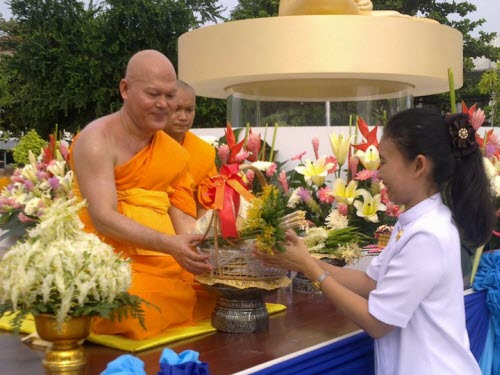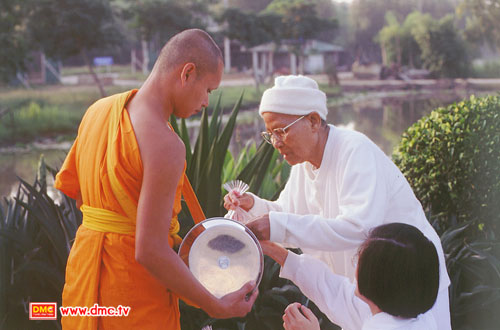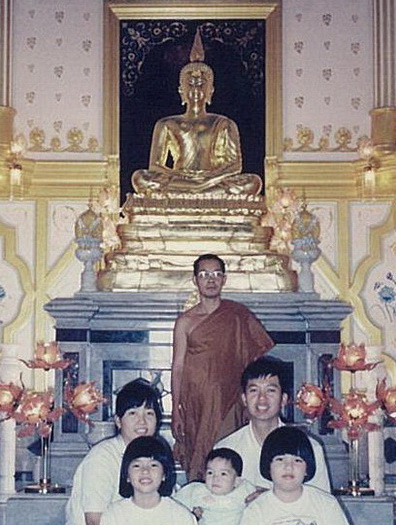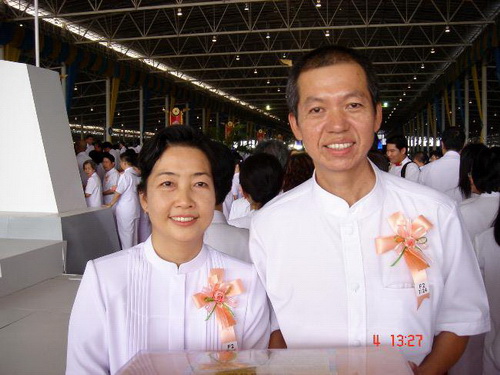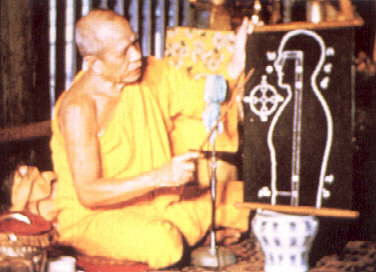Blessing Six:
Setting oneself up properly in life
Setting oneself up properly in life

C. ILLUSTRATIVE EXAMPLES
C.1 Metaphor: Boat must have a rudder
If the ship that must struggle to make way in the ocean waves is to reach the far shore, its captain must have a clear destination in mind and keep the ship firmly on course, not allowing the ship to drift — no less important is an aim in life to those wishing to achieve success and profit in their lives.
C.2 Metaphor: The one-eyed sea turtle (S.v.455)
The Lord Buddha taught that the birth of someone as a human is as rare as the chance of a blind turtle in the ocean which surfaces for air once a century popping its head through the middle of the only flower garland which happens to be floating in the sea. The chance of a being which is a denizen of hell, an animal, a ghost or a demon attaining human birth is even slighter still. Therefore having obtained yourself a human birth makes sure you make the best of your life.
C.3 Metaphor: Saving for the Future
Just as a wise merchant must keep aside some of his money for investment in the future, the wise man must keep aside some of his time for the practices that will allow him to renew his merit for future lifetimes. Just as the wise farmer keeps aside some of his rice crop for next year’s sowing, the wise man will take the opportunity while his old merit is still giving its fruit, to accrue new merit for use in future existences.
C.4 Ex.: The Retribution of Kapila Bhikkhu DhA.iv.37ff.
In the time of the Lord Buddha named Kassapa, there was a gang of five hundred thieves who were bringing misery to the whole of the kingdom. The householders, together with the police and the army thus hunted down the gang and when the thieves saw that they could no longer defend themselves, they escaped into the forest. The vengeful householders did not give up chase and so the thieves went deeper and deeper into the forest until they came to a clearing in the heart of the forest. There they met a monk, and seeing the monk, they started to see the error of their ways. They were receptive to what the monk had to say, and the monk taught them that they must keep the Precepts even if it cost them their lives. In any case, if they were to be caught, no-one would spare their lives because they had already murdered so many people. The thieves took the Five Precepts and didn’t try to escape any more. They concentrated all their attention on keeping the Precepts pure. They would not hurt even a mosquito or a leech. Even if the soldiers were to catch up with them and attack them with swords and knives, they swore not to put up a fight.
Before long, the soldiers discovered the thieves and attacked. The thieves kept their word and put up no resistance — they were so devoted to keeping their Precepts pure. All five hundred thieves were executed, but through the power of keeping the Precepts to the degree they would sacrifice their lives, their bad deeds didn’t have the chance to catch up with them. They were born instantly as angels. The evil of their past did not disappear, however, but was waiting for the opportunity to give its retribution.
When they were reborn from the celestial world into the human realm, the influence of the killing they had done in the past still affected them. All five hundred were born as fishermen in the same village. However, even though their livelihood was to kill fish, through the power of their good deeds in the past, they all still had faith in Buddhism. Even so, the fishermen continued to collect demerit as a result of their habitual killing.
One day a group of fishermen caught a giant, golden-coloured fish — as big as a boat. No-one had ever seen such a fish in their lives. They captured the fish and took it to offer to King Pasenadi of Kosala — who in turn took the fish to the Buddha. As soon as the fish opened its mouth, a foul smell spread all around the Jetavana monastery. The king then asked the Buddha why such a beautiful fish should have such a foul smell.
The Enlightened One then revealed that in one of his past existences, the fish had been a learned bhikkhu named Kapila during the time of Kassapa Buddha. Because of his deep knowledge of the Dhamma, he had gained much fame and honour. He also became very conceited and looked down upon the other bhikkhus. When the other bhikkhus pointed out to him what was proper or not proper, he invariably retorted, ‘How much do you know?’ implying that he knew much more than those bhikkhus. In the course of time, most of the bhikkhus avoided him. On one occasion, the bhikkhus did not join him when he was reciting the Fundamental Precepts for the bhikkhus (i.e., the Pāṭimokkha). Observing that the bhikkhus remained silent, Kapila said, ‘There is no such thing as Sutta, Abhidhamma or Vinaya. It makes no difference whether you listen to the Pāṭimokkha or not’ and left the congregation. He had taught the Dhamma to others in a way that was biased in the monk’s self interest — in a way that made his teaching deviate from the truth. His misrepresentation of the Dhamma was thus perpetuated amongst his followers.
There were many others including his teacher and arahants who had warned that monk of the danger of his misrepresentation of the Dhamma — however he would not listen. He insulted them in return for their advice. As a result he developed False View and when he passed away, these False Views dragged him down into the Unfortunate Realms for a long time. Only then could he be born as a fish. The Precepts of a monk gave their fruit as the beautiful golden appearance of the fish but the retribution from insulting arahants and his teacher gave him his stinking mouth. Hearing the previous karma of the fish, the five-hundred fishermen considered all the evil deeds they had done as a result of their livelihood since their youth. They realized that their time in hell would certainly be no less than the fate of the fish they had caught — so they decided collectively all to become monks and to devote themselves to Dhamma practice. From the power of having sacrificed their lives for their Precepts in a previous existence — i.e. having set themselves up properly in life — before long they could all become arahants and were no longer subject to the retribution of the evil karma of their past.
C.5 Ex. Akkosaka Bhāradvāja Vatthu DhA.iv.161ff.
In the time of the Buddha there was a Brahmin couple. The husband called Bhāradavāja was very strict in his Brahmin observances. He had never shown any interest in Buddhism. By contrast, his wife was a person with no further doubt in Buddhism because she had heard one of the teaching of the Buddha and had become enlightened as a stream-enterer as the result.
One day the husband wanted to hold a feast for all the highest standing Brahmins — worshipped as ‘arahants’ in their religion. Thus the husband and wife started their elaborate preparations for the feast, but when it came close to the ‘big day’, because it was the habit of the wife always to exclaim ‘Buddho!’ whenever something surprised her, her husband appealed to her on the day of the feast not to mention anything about Buddhism or to say anything in praise of the Triple Gem. The wife said, “My mind is unified with the Dhamma, therefore whatever I say will also be Dhamma — there is nothing you can do to stop my mind from being that way!”
“And what about if I take a sword and cut you into small pieces — will that help you to educate your mind?”
“Even if you were to make mincemeat of me,” said the wife, “I could not help myself from having the Dhamma as my refuge!”
The husband didn’t know what more to say — so they got on with the work of providing the feast. Everything went well until the wife slipped over on a pile of spilled rice. She exclaimed, “Namo tassabhagavato arahato sammā sambuddh-assa!”
Everyone present heard the wife’s exclamation. The assembled Brahmins were angered by what they heard. When they had received the invitation, they understood that the wife had respect for them. Now they had found out that she respected not them but the Buddha. They were especially angry because they were opposed to everything the Buddha did. Those who had finished their meal immediately stood up and shouted insults at the couple. Those who had not finished eating overturned every plate of food on the table. They stamped their feet and walked out on the couple.
The husband was so angry he didn’t know what to say. He couldn’t do anything to punish his wife — so he thought to take out his anger on his wife’s teacher — the Buddha himself. He buckled on his sword and turned in the direction of Jetavana monastery with the intention to put an end to the Buddha and his teachings. The husband walked straight up to the Buddha without paying respect and in his anger shouted the rhetorical question at the Buddha, “Do you know what a man has to kill in order to get a good night’s sleep...?”
The Brahmin thought that putting an end to the Buddha was the only way he could save face and sleep soundly that night. Without waiting for an answer, the Brahmin continued, “... and what a man has to kill to cure his sorrow? . . .”.
And still without waiting for an answer, the Brahmin asked the Buddha, “. . . and so what form of killing would you support?”
The Buddha knew what was on the mind of the Brahmin and coolly answered the first question with the words, “A man must kill his anger in order to get a good night’s sleep. If you don’t kill your anger, you will do things that you regret later, being put in prison or punished — but if you kill your anger, you don’t need to undergo the sorrowful consequences of your angry deeds. The Noble Ones praise the killing of anger — whose root is poison and whose crown is sweet.”
When the Buddha said that the root of anger is poisonous, he meant that anger has suffering as its result. When he said that the crown is sweet, he meant that we get a strange, twisted satisfaction out of expressing our anger to others or losing our temper.
After hearing only these few words, Bhāradavāja was impressed. He was impressed that the Buddha was not angry in response to his anger. He had prepared his sword to chop the Buddha to pieces at the first unwelcome word, but instead of hearing anything to irritate him further, the Brahmin had been impressed by every one of the Buddha’s reasoning. He threw away his sword and invited the Buddha to teach him further. In the end, he was motivated to practise the Dhamma further and ended up ordaining as a monk.
Killing your anger is one way of setting yourself up in life. To ordain as the result of a teaching is to set yourself up in faith, in the Precepts, in Wisdom or in Meditation. It was in this intense way that Bhāradavāja set himself up in life, and before long could practice until attaining arahantship

